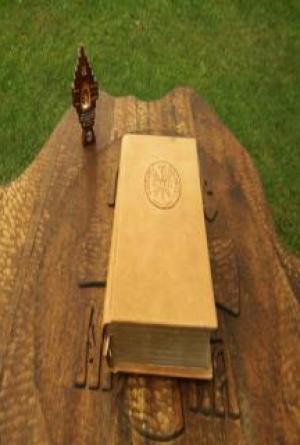Introduction
What is the aim of Allah sending us to this world. When a person does not understand the aim of any work, that work can never be correct. We should therefore understand what is the aim of our life in this world. This world is a foreign place for us while the hereafter is our actual homeland. First listen to the examples of this world being a foreign place. People come from Kashmir, Quetta and different parts of Pakistan to earn a living in Karachi. They earn some money and collect it. When they return to their homeland, that is Kashmir, Quetta, Manserah, Hazarah or wherever they come from, they take the money in cash and live there with splendour. Or they purchase items like a chair, become a chairman and go from here. They are then well respected and people praise them for having earned well in Karachi. Thereafter they are invited everywhere for meals. The teacups of Karachi are used for them. This shows that they understood their aim of going to a foreign place. They did not use their foreign earnings in the foreign place. They did not use their Karachi earnings in Karachi. They took it back to their homeland where they were respected. Had they spent their Karachi earnings in Karachi, they would not have been respected and people would have called them fools.
Three Types Of Travellers
People that travel from a foreign place to their homeland in the world are of three types. Some people only take cash because the same currency is used in their homeland as in other parts of the country. This cash can be of use to them there as well. Some people take goods only while others take cash and goods. That is, they take things like chairs, teacups, plates, carpets etc. They take sheets for their visitors. When we go to Kashmir, we find the name Kashmir written on the shawls used in the mountains. Then we also learn that the people have brought along tea cups. These are the three types of travelers in this world. Firstly, those who take cash only, secondly those who take goods instead of cash because they know they will not find these items in the villages. The third category is those who take both cash and kind.
The Goods of This World
From this we understand that when we depart to the hereafter after our visa for the world has expired, what all the different types of people take with them. Does anyone take any currency of this world to the hereafter when his janazah is lowered in the grave? Does anyone take with him plates, cups, mobile telephones, clean sheets, cars etc? Does anyone take both cash and kind? He neither takes kind nor any cash nor both. When we leave the world and our janazah enters the grave, a poet says:
Thanks to those who brought me to the grave.
Now we will go alone from this stage onwards.
Another poet says:
They all pressed me into the grave and left without any dua or salam.
What has happened to time in such a short while
Those servants who walked to and fro serving one, who washed one's clothes, who rubbed oil onto one's body and who massaged one's legs will be throwing sand on the grave and departing.
The Definition Of Shakur
I have suddenly remembered an incident with the mentioning of throwing sand. I regard this sudden remembrance as an indication from Allah that I should narrate the incident. Otherwise I would not have remembered it suddenly. One of Allah s names is Shakur. Mulla Ali Qari (Rahimahullah) writes in Sharhul Mirqat under the explanation of the name Shakûr that one of the ninety nine names of Allah is Shakûr. Its meaning is:
The one who gives reward in abundance for a little amount of action.
For example, if you safeguarded your gaze from staring at attractive faces and ghair mahram (Women who you can marry and are not permissible to look at.) women, then what great act is it? You have been protected from punishment, disgrace and an illicit love affair. Even women have an impression that this person who is safeguarding his gaze is some saint. Had he stared, the honour of his beard would have been polluted. The honour of his round hat would have terminated. Allah has granted three rewards for protecting one's gaze. This is a proof of His being Shakûr.
Protection from Uneasiness
What is the first reward? It is protection from being uneasy. After staring at a female, one's uneasiness increases. He feels, "I wish I could have got her." You are therefore saved from uttering the word 'wish' and you are saved from expressing regret.
The first reward is thus called 'protection from regret'. Now a person will not regret because he did not glance. The simple food of the house like chutney and roti will seem like biryani and plow because it is a bounty granted by Allah. Tell me, if all the women of the world had to send biryani and plow for Majnûn while Layla, whom he was madly in love with sent dry bread, whose food would he have eaten? He would have eaten Layla's food and said, "This dry bread came from Layla's hand." Therefore the saints who are the lovers of Allah, regard their wives better than all the Laylas of the world. They know that Allah has granted them their wives.
That is the reason they live in peace. There is complete tranquillity in their homes. While on the contrary, those who gaze around here and there, are always perturbed and their homes have no blessing. Their homes are full of quarrels and fights because the husband has another woman in mind. His wife does not seem attractive anymore. Therefore, what is the first reward for safeguarding the gaze? It is protection from problems, uneasiness and regret.
The Sweetness Of Iman
The second reward is that one experiences the sweetness of Iman. Rasulullah Sallallahu alayhi wa sallam has narrated a hadithe qudsi. The muhaditheen have stated that a hadithe qudsi is the statement of Rasulullah Sallallahu alayhi wa sallam, which he narrates from Allah Subhanahu wa Ta'la by saying, "Allah Subhanahu wa Ta'la says."
Rasulullah Sallallahu alayhi wa sallam has narrated in a hadithe qudsi that Allah Subhanahu wa Ta'la said, "The gaze is a poisonous arrow from among the arrows of Iblis (satan). Whoever protected his heart and gaze from this arrow due to My fear, I will grant him the sweetness of Iman that he will perceive in his heart."
Due to the fact that he sacrificed the sweetness of his sight for Allah's sake, Allah Subhanahu wa Ta'la will grant him the sweetness of the heart. Allamah Ibn Qayyim (Rahimahullah) says that a person gave his basarat [gaze] and obtained basîrat [insight]. Basarat refers to sight. By sacrificing his sight, Allah Subhanahu wa Ta'la gave him the reward of the sweetness of Iman in his heart.
A Good Ending
Mulla Ali Qari lived in Hirat an







